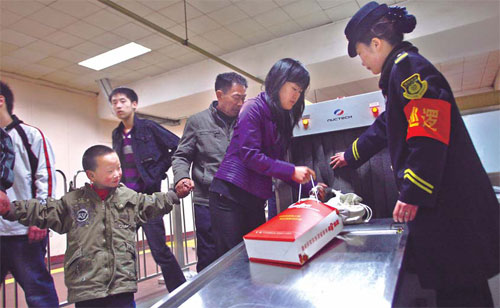Society
Subways enhance security measures
By Li Wenfang in Guangzhou, Qian Yanfeng in Shanghai and Cao Li in Beijing (China Daily)
Updated: 2010-04-06 06:53
 |
Large Medium Small |
On the right track?
 |
|
A young woman puts her baggage through the subway scanning system in Beijing. Almost every station in the city employs the system. [ZOU HONG / CHINA DAILY] |
After the initial shock of the Moscow attacks, many commuters said they are confident China's security measures can successfully prevent a terrorist attack on its subway networks.
"There are many security people around and all these devices, so the authorities seem to be serious about subway security," said Li Li, a 36-year-old doctor who uses Beijing Subway from Monday to Friday. "I have no fears when it comes to using the subway."
Zhu Chengguang, a Shanghai logistics company employee in his 30s, said he is happy to put up with the often time-consuming security checks because he is afraid of potential attacks. "Public transport, such as metro trains, has increasingly been used as a target for terrorist attacks. I have to spend about an hour on the metro every day and, with the world expo less than a month away, I am worried (Shanghai Metro) could be a target," he said.
Security scans at Beijing subway stations alone have uncovered almost 57,000 illegal items being carried by passengers, including 17 guns, 122 bullets, three bombs and 21,461 knives, as well as at least 18,000 flammable items and 126 toxic items, according to Jia Peng, a spokesman for Beijing Subway, last June.
However, some commuters are not convinced the heightened measures are enough of a deterrent.
"I'm very worried (about an attack)," said Duan, a 23-year-old Beijing accountant. "These scanners cannot do much. People can smuggle weapons into the subway by putting them into pockets. They can also take bags in if they simply ignore the scanners." In English, he added: "This is the illusion of security, not real security."
For Song Xiaojun, a military strategist in Beijing, the security in the capital is very real.
"We have so many people working on safety - subway employees, security staff and volunteers," he said. "No other country can compare with China in this aspect, and any terrorist should be frightened. Also, China has strict controls on explosives, which rules out most dangers.
"Considering the current facilities and the volume of passengers, our subway authorities are doing their best to ensure safety."
Beijing Subway officials were unavailable for comment at the weekend, and an administrator at Huixin Xijie Nankou station said he had "just been told not to say anything to anyone about the security".
Wang Jiqing, a retiree who lives nearby and is one of the 10 volunteers who inspect the station every day, added: "I have been a volunteer for more than two years and checkups here are much stricter than anytime before."
However, Lu at Hongqiao Station in Shanghai admitted problems still exist.
"It is almost impossible to find explosives if passengers simply keep them in their clothes, as we only scan passengers' handbags. Body searches take too much time and are not practical," he said. "There are also some people who refuse to cooperate. In these cases we can do nothing and that could be a potential threat to commuters."
Predictably, the worst time is during rush hours, Lu said. "Some people simply charge in without listening to our calls."
Subway systems in China's largest cities also suffer from serious overcrowding problems, say transport experts. In Guangzhou, several commuters said they believe the biggest danger to subway security is a stampede of panicked passengers.
"If there is a risk, it comes from overcrowding, not terrorism," said a middle-aged woman on the city's metro. A middle school student traveling on the same train agreed, adding: "It is too crowded and especially dangerous when you use the escalators."
Guangzhou Metro spokesman Ye said in response: "Guangzhou Metro is crowded but it is absolutely safe. At peak times, our staff helps direct the flow of passengers at the scanning points, on escalators, in elevators and on platforms."
Trains are also equipped with high-tech surveillance cameras so drivers can inform stations quickly about any accidents or dangers, he said.
Wang Shanshan in Beijing and Liang Zhuohui in Guangzhou contributed to this story.







